State of Play
(They’re genuinely helpful in quantifying what the episode did.)
The choir goes off. The board is laid out thusly:
Lions of Meereen: Tyrion Lannister
Lions of King’s Landing: Jaime Lannister, Cersei Lannister
The Dragon, Daenerys Targaryen
Ships of the Wall: Davos Seaworth
Burning Hearts of the Wall: Melisandre
Roses of King’s Landing: Margaery Tyrell
Snakes of Dorne: Elyria Sand
Direwolves of Winterfell: Sansa Stark
Direwolves of Braavos: Arya Stark
Spiders of Meereen: Varys
Kraken of Winterfell: Theon Greyjoy
Shields of Winterfell: Brienne of Tarth
Stars of King’s Landing: The High Sparrow
The Sword, Daario Naharis
Flayed Men of Winterfell: Roose Bolton, Ramsey Bolton
With the Bear, Iain Glenn
The episode is in nine parts. The first runs eight minutes and is set at the Wall. The opening shot is of the Wall at sunrise, as the camera pans down into Castle Black.
The second runs ten minutes and is set in Winterfell. The first section is three minutes long The transition is by image, from Jon Snow’s dead body to Miranda’s. The second section is seven minutes long. The transition is by dialogue, from Ramsey and Roose talking about Sansa to Sansa.
The third part runs six minutes and is set in King’s Landing. The first section is four minutes long. The transition is by hard cut, from Brienne’s anguished face to the sails of Jaime’s ship. The second section is two minutes long. The transition is by hard cut, from Jaime holding Cersei to Septa Unella’s book.
The fourth part runs two minutes and is set in Dorne. The transition is by hard cut, from Margaery in her cell to a garden in Sunspear.
The fifth runs one minute and is set in King’s Landing. The transition is by family, from Doran to Trystane Martell.
The sixth runs four minutes and is set in Meereen. The transition is by hard cut, from Trystane’s corpse to an establishing shot of the city.
The seventh runs nine minutes and is set in the Dothraki Sea. The first section is three minutes long. The transition is by faction, from Varys and Tyrion to Jorah and Daaario. The second section is six minutes long. The transition is by dialogue, from Jorah and Daario concluding that the Dothraki have captured Daenerys to Daenerys among the Dothraki.
The eighth runs two minutes and is set in Braavos. The transition is by hard cut, from Daenerys to a street in Braavos.
The ninth runs five minutes and is set at the Wall. The transition is by family, from Arya Stark to Jon Snow. The final image is of Melisandre going to bed.
Review
For what is surely the most highly anticipated episode of Game of Thrones ever – the first 100% off-book episode (well, 90% – Arya’s still in A Dance With Dragons) – this is a shockingly thin and uninspiring thing. Given that… I’d say there’s a fine line between a languid start and just trolling the audience, but it’s not that fine a line, and the title is on the wrong side of it.…
Continue Reading
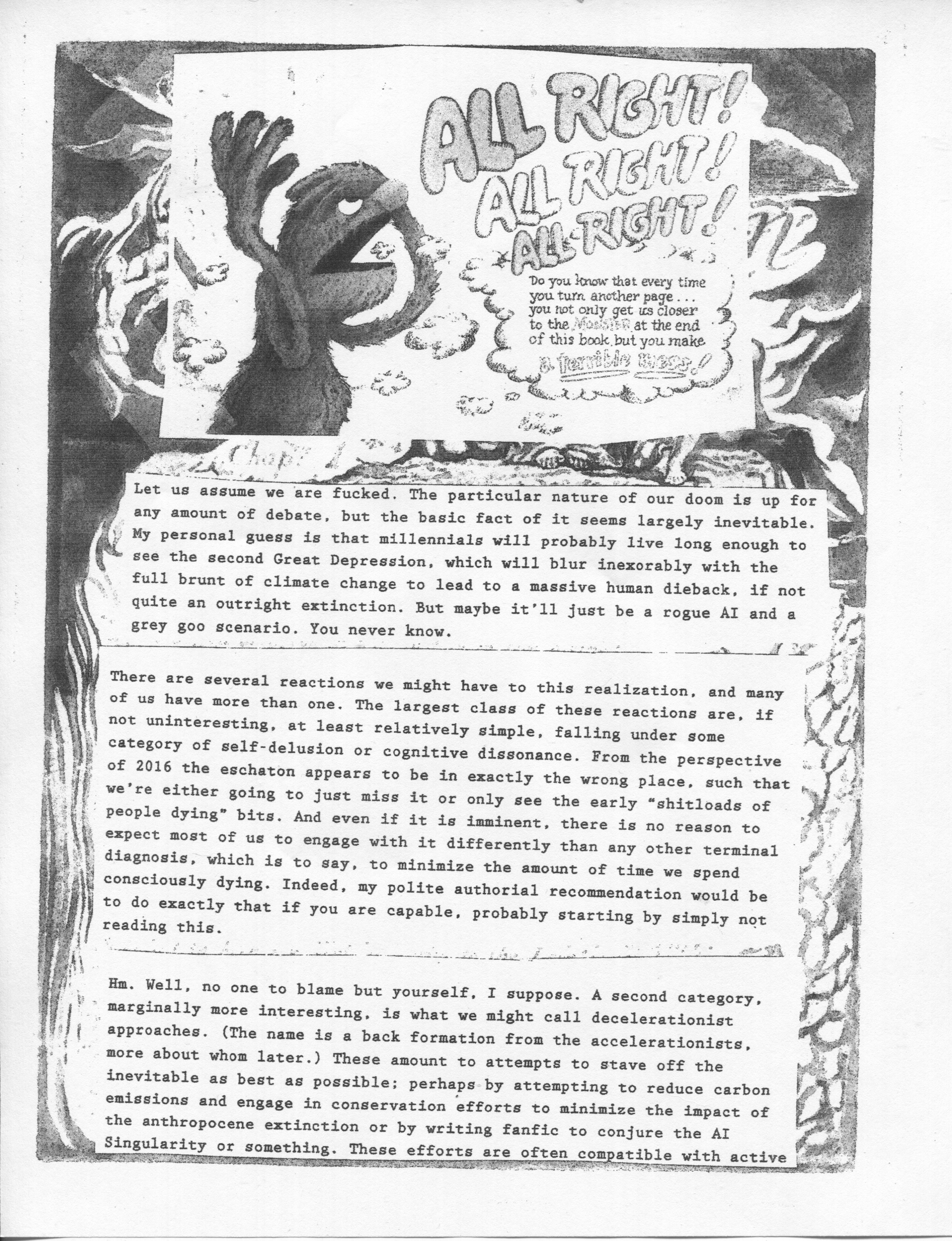 Two more pages below the cut.
Two more pages below the cut. 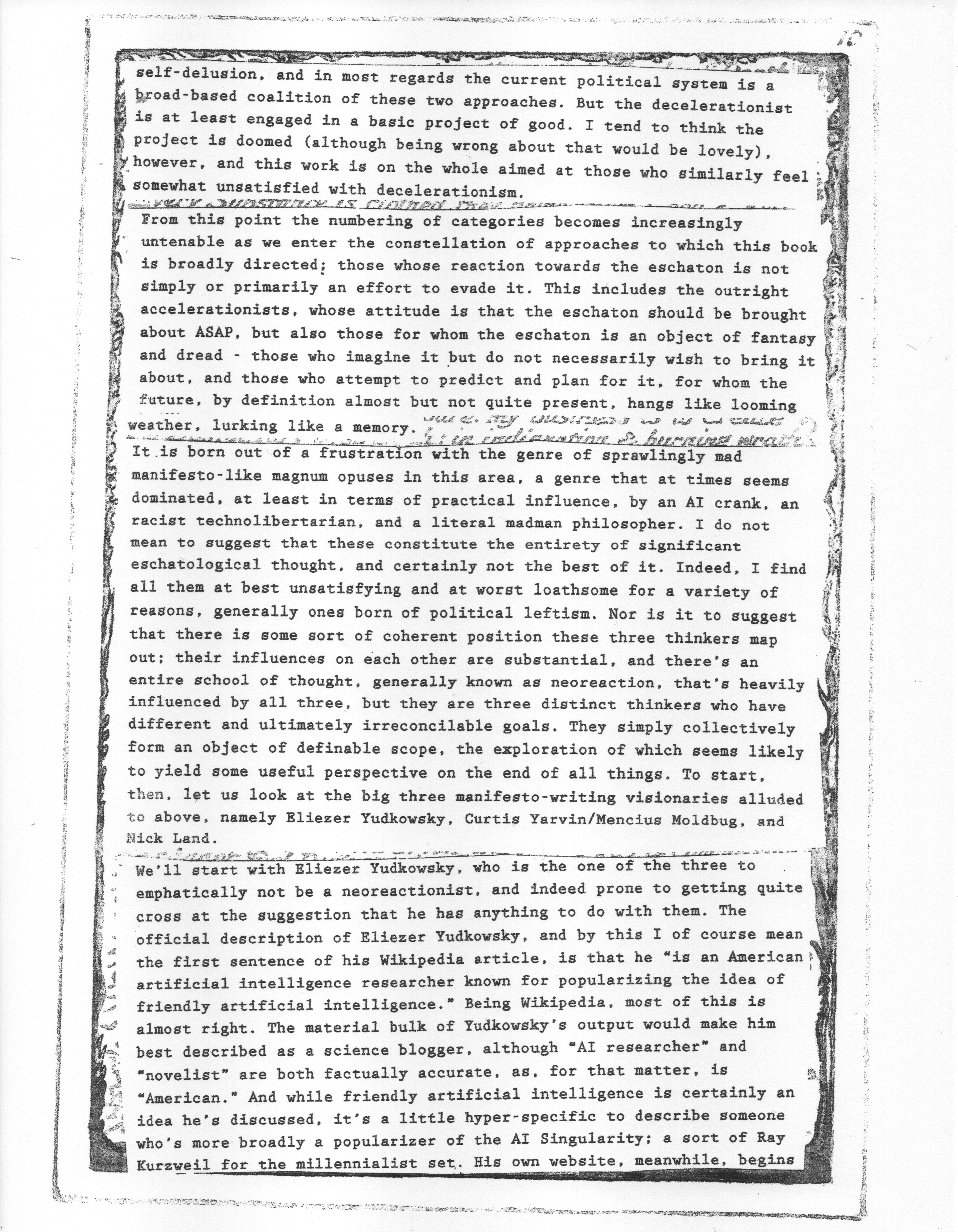
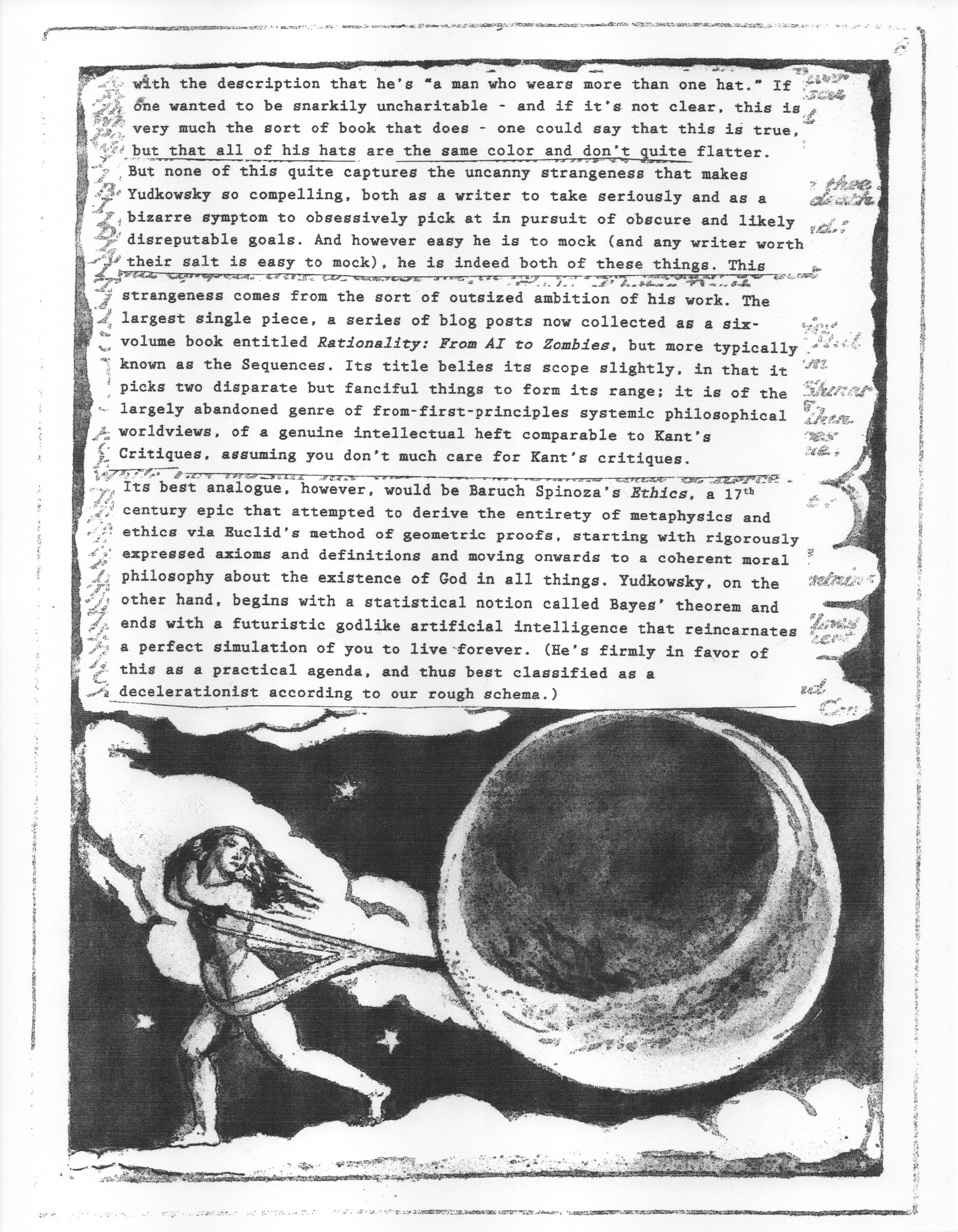 …
…
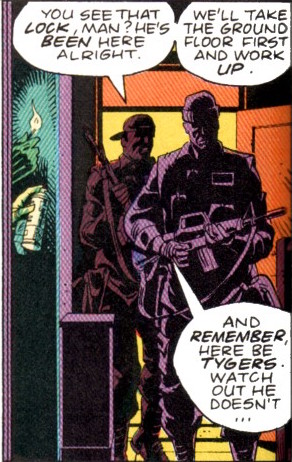 But there is a more foundational aspect of Blake’s unfixed style – one upon which these textual incommensurabilities build. Blake’s illuminated works exist in individually printed and hand-colored copies, no two of which are identical. In the case of The Book of Urizen, for instance, eight copies are known to exist, six of which are widely available. And the differences among these copies are significant; as mentioned, the fourth plate (from which the “solid without fluctuation” line originates) only exists in three of the copies. No two copies place the full-plate illustrations in the same order or locations throughout the text. Plates 8 and 10 each contain the beginning of a section labeled Chapter IV, each of which begins with a stanza numbered 1; on top of that, the order of the two plates is reversed in several copies. Several illustrations change dramatically across copies as well; Plate 6 depicts three figures hung upside-down, bound in serpents, and cast into fire, save for in Copy D, where there is but a single figure. Plate 16, meanwhile, depicts Los in two of the three copies in which it is included, while in a third the figure is given a white beard indicating that it is Urizen. And these are just the variations with the biggest interpretive implications: every page of every copy has its own idiosyncratic decisions of coloring. Nor is this phenomenon unique to The Book of Urizen. Even Blake’s most iconic and nominally fixed poem, “The Tyger,” exists in nearly thirty separate copies, printed and colored over the course of more than thirty years, with major differences across the coloring.
But there is a more foundational aspect of Blake’s unfixed style – one upon which these textual incommensurabilities build. Blake’s illuminated works exist in individually printed and hand-colored copies, no two of which are identical. In the case of The Book of Urizen, for instance, eight copies are known to exist, six of which are widely available. And the differences among these copies are significant; as mentioned, the fourth plate (from which the “solid without fluctuation” line originates) only exists in three of the copies. No two copies place the full-plate illustrations in the same order or locations throughout the text. Plates 8 and 10 each contain the beginning of a section labeled Chapter IV, each of which begins with a stanza numbered 1; on top of that, the order of the two plates is reversed in several copies. Several illustrations change dramatically across copies as well; Plate 6 depicts three figures hung upside-down, bound in serpents, and cast into fire, save for in Copy D, where there is but a single figure. Plate 16, meanwhile, depicts Los in two of the three copies in which it is included, while in a third the figure is given a white beard indicating that it is Urizen. And these are just the variations with the biggest interpretive implications: every page of every copy has its own idiosyncratic decisions of coloring. Nor is this phenomenon unique to The Book of Urizen. Even Blake’s most iconic and nominally fixed poem, “The Tyger,” exists in nearly thirty separate copies, printed and colored over the course of more than thirty years, with major differences across the coloring.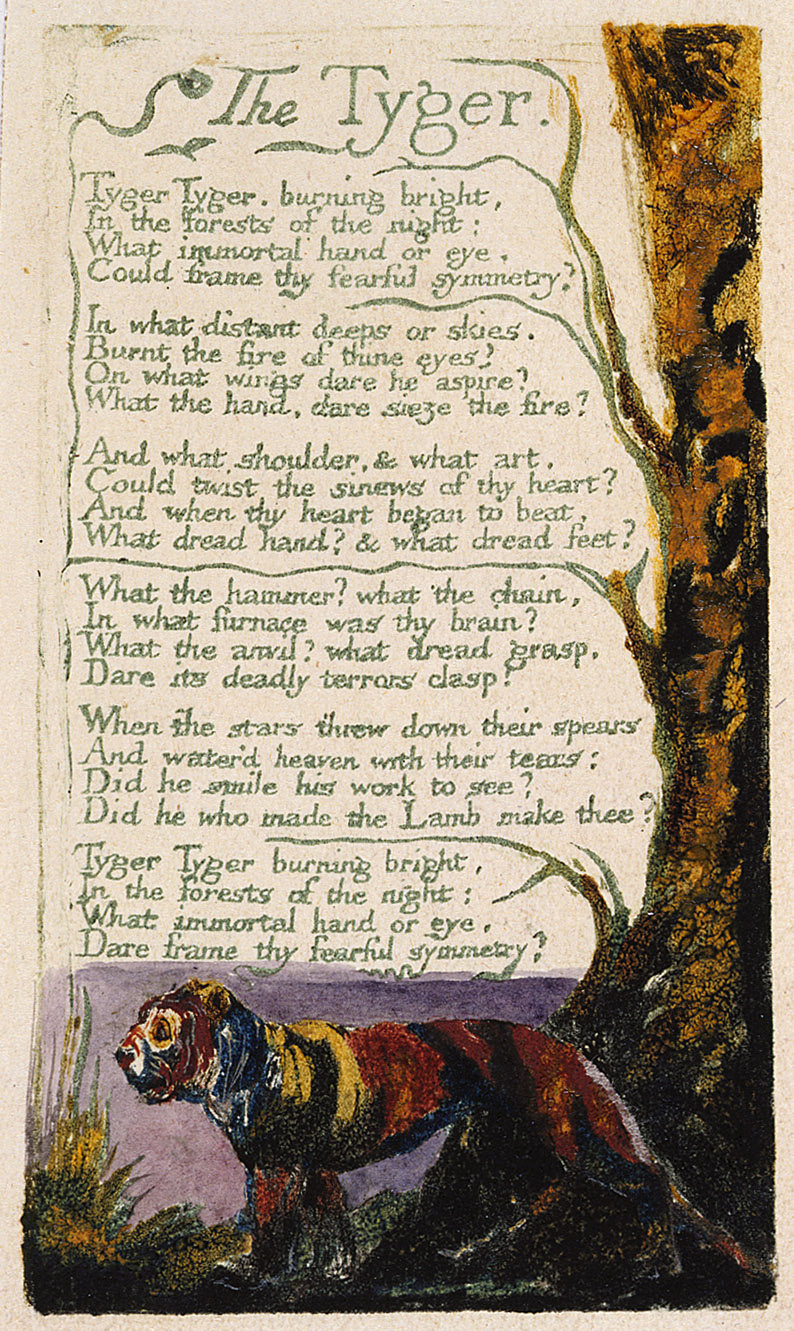

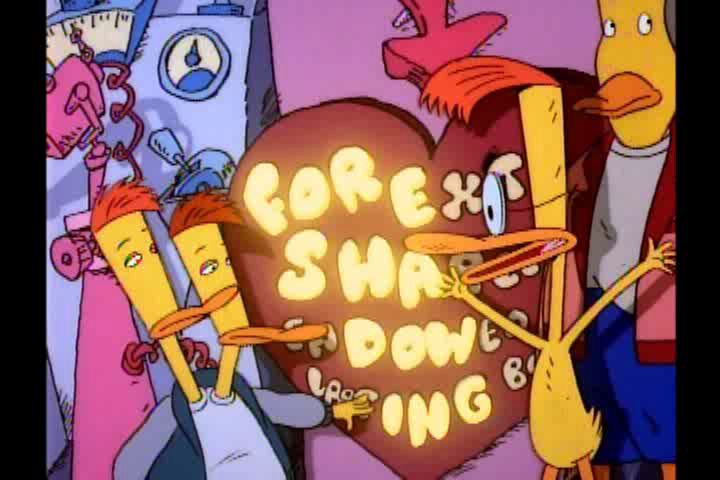 With Shabcast 18 vanished into the ether, this week we move straight on to Shabcast 19. My now-frequent-interlocutor Daniel Harper of
With Shabcast 18 vanished into the ether, this week we move straight on to Shabcast 19. My now-frequent-interlocutor Daniel Harper of 
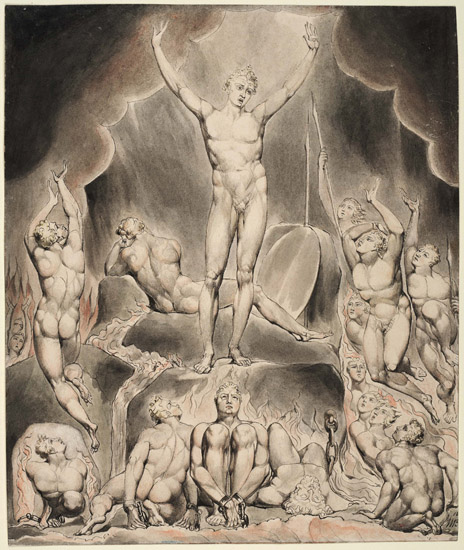 The Kickstarter for Neoreaction a Basilisk will begin next week. For now, here’s another excerpt, this time after a section looking at the notion of “the red pill,” a concept Mencius Moldbug introduced to the alt-right, and claims that his blog offers readers.
The Kickstarter for Neoreaction a Basilisk will begin next week. For now, here’s another excerpt, this time after a section looking at the notion of “the red pill,” a concept Mencius Moldbug introduced to the alt-right, and claims that his blog offers readers.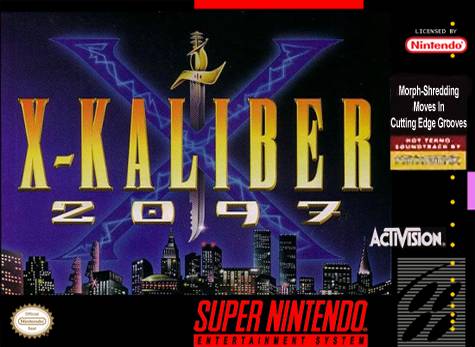 This wasn’t on the original list of games to be covered. Consider its inclusion something of a magickal mistake, honored as hidden intention. I cast my initial circle carelessly, and, through an accident of timing, ensconced a particular monster within the territory covered. This, then, is the consequence.
This wasn’t on the original list of games to be covered. Consider its inclusion something of a magickal mistake, honored as hidden intention. I cast my initial circle carelessly, and, through an accident of timing, ensconced a particular monster within the territory covered. This, then, is the consequence.